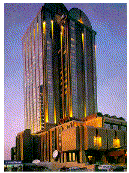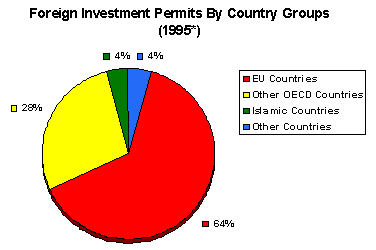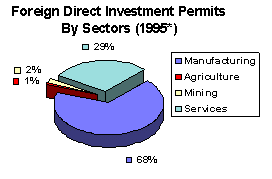 The
Turkish Government considers foreign capital an essential factor in
its efforts to rank among the top economic powers of the world at
the end of the 20th century. Flexible foreign investment policies
have been introduced as part of the liberalization of the Turkish
economy. The foreign investment laws provide a secure environment
for foreign capital via support from several bilateral and
multilateral agreements and organizations, granting such capital the
same rights and obligations as local capital while guaranteeing the
transfer of profits, fees and royalties, and the repatriation of
capital in the event of liquidation or sale. The
Turkish Government considers foreign capital an essential factor in
its efforts to rank among the top economic powers of the world at
the end of the 20th century. Flexible foreign investment policies
have been introduced as part of the liberalization of the Turkish
economy. The foreign investment laws provide a secure environment
for foreign capital via support from several bilateral and
multilateral agreements and organizations, granting such capital the
same rights and obligations as local capital while guaranteeing the
transfer of profits, fees and royalties, and the repatriation of
capital in the event of liquidation or sale.
Investors, upon discovering
these policies and the remar kable
opportunities Turkey offers in its unique location, extensive local
and regional markets, skilled labor force and fairly developed
infrastructure, have not been hesitant in utilizing them. kable
opportunities Turkey offers in its unique location, extensive local
and regional markets, skilled labor force and fairly developed
infrastructure, have not been hesitant in utilizing them.
At present there are more than 3160
enterprises with foreign partnership in operation in various
sectors. Almost 15% of the industrial output of the country is
produced by enterprises with foreign capital. Among the major
investors one can find familiar names such as Toyota, Honda, Mazda
from Japan, GM, Philip Morris, Reynolds, General Dynamics, Hilton,
Sheraton, Hyatt Regency from the USA; Cement Francaise, Total,
Renault from France, Siemens, AEG, Bosch, Mercedes from Germany, and
Pirelli and Fiat from Italy. These companies are just some of the
many international firms poised to take advantage of Turkey's
favorable investment policies. Favorable results of the
liberalization policies and promotion measures adopted have appeared
as increased direct foreign investment flows into the country. While
the cumulative foreign capital between 1954 and 1979 was $228
million, this amount reached $1.8 billion in 1992, $2.2 billion in
1993, $1.5 billion in 1994 and $2.9 billion US in 1995.

* : January - October Period
Source: Undersecretariat of the Treasury
These figures simply indicate that,
despite the negative effects of the Gulf Crisis, the Foreign
Investment Policy of Turkey and other measures have satisfied the
requirements of foreign investors. The Foreign Investment Law and
the corresponding Decree provides guarantees for foreign capital and
guarantees the transfer of profits, fees and royalties. In addition
to the guarantees provided by the investment legislation, the
Turkish Government provides a well protected environment for foreign
capital by being participants in several bilateral and multilateral
agreements and organizations such as OECD Codes, Investment
Promotion and Protection Agreements, Agreements on Avoidance of
Double Taxation, Settlement of Disputes and Investment Guarantees.
On the other hand, all fields which
are open to the Turkish private sector are open to foreign
participation and investment without any limitation on the equity
participation ratio of the foreign shareholders.
To implement and coordinate foreign
capital entries effectively, the Turkish Government has
reestablished the General Directorate of Foreign Investment (GDFI)
within the Undersecretariat of the Treasury (UT). This General
Directorate is authorized to assist and guide foreign investors in
exploring investment opportunities in Turkey, register and approve
license, royalty and management agreements, negotiate bilateral
investment protection and promotion agreements, and coordinate
Build-Operate-Transfer projects and Privatization Programs
.
* : Provisional
Source: Undersecretariat of the Treasury
|

